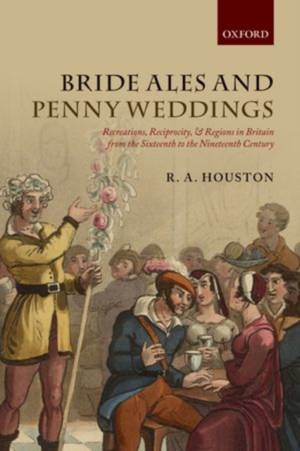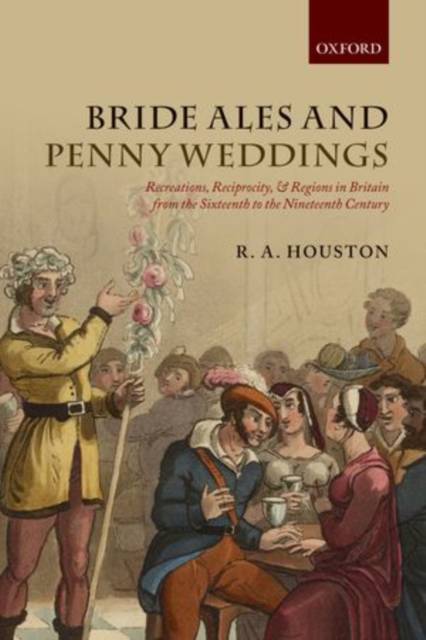
Bedankt voor het vertrouwen het afgelopen jaar! Om jou te bedanken bieden we GRATIS verzending (in België) aan op alles gedurende de hele maand januari.
- Afhalen na 1 uur in een winkel met voorraad
- In januari gratis thuislevering in België
- Ruim aanbod met 7 miljoen producten
Bedankt voor het vertrouwen het afgelopen jaar! Om jou te bedanken bieden we GRATIS verzending (in België) aan op alles gedurende de hele maand januari.
- Afhalen na 1 uur in een winkel met voorraad
- In januari gratis thuislevering in België
- Ruim aanbod met 7 miljoen producten
Zoeken
Bride Ales and Penny Weddings
Recreations, Reciprocity, and Regions in Britain from the Sixteenth to the Nineteenth Centuries
R A Houston
Hardcover | Engels
€ 290,45
+ 580 punten
Omschrijving
Some of the poorest regions of historic Britain had some of its most vibrant festivities. Between the sixteenth and nineteenth centuries, the peoples of northern England, Lowland Scotland, and Wales used extensive celebrations at events such as marriage, along with reciprocal exchange of gifts, to emote a sense of belonging to their locality. Bride Ales and Penny Weddings looks at regionally distinctive practices of giving and receiving wedding gifts, in order to understand social networks and community attitudes.
Examining a wide variety of sources over four centuries, the volume examines contributory weddings, where guests paid for their own entertainment and gave money to the couple, to suggest a new view of the societies of 'middle Britain', and re-interpret social and cultural change across Britain. These regions were not old fashioned, as is commonly assumed, but differently fashioned, possessing social priorities that set them apart both from the south of England and from 'the Celtic fringe'. This volume is about informal communities of people whose aim was maintaining and enhancing social cohesion through sociability and reciprocity. Communities relied on negotiation, compromise, and agreement, to create and re-create consensus around more-or-less shared values, expressed in traditions of hospitality and generosity. Ranging across issues of trust and neighbourliness, recreation and leisure, eating and drinking, order and authority, personal lives and public attitudes, R. A. Houston explores many areas of interest not only to social historians, but also literary scholars of the British Isles.
Examining a wide variety of sources over four centuries, the volume examines contributory weddings, where guests paid for their own entertainment and gave money to the couple, to suggest a new view of the societies of 'middle Britain', and re-interpret social and cultural change across Britain. These regions were not old fashioned, as is commonly assumed, but differently fashioned, possessing social priorities that set them apart both from the south of England and from 'the Celtic fringe'. This volume is about informal communities of people whose aim was maintaining and enhancing social cohesion through sociability and reciprocity. Communities relied on negotiation, compromise, and agreement, to create and re-create consensus around more-or-less shared values, expressed in traditions of hospitality and generosity. Ranging across issues of trust and neighbourliness, recreation and leisure, eating and drinking, order and authority, personal lives and public attitudes, R. A. Houston explores many areas of interest not only to social historians, but also literary scholars of the British Isles.
Specificaties
Betrokkenen
- Auteur(s):
- Uitgeverij:
Inhoud
- Aantal bladzijden:
- 260
- Taal:
- Engels
Eigenschappen
- Productcode (EAN):
- 9780199680870
- Verschijningsdatum:
- 6/05/2014
- Uitvoering:
- Hardcover
- Formaat:
- Genaaid
- Afmetingen:
- 157 mm x 234 mm
- Gewicht:
- 544 g

Alleen bij Standaard Boekhandel
+ 580 punten op je klantenkaart van Standaard Boekhandel
Beoordelingen
We publiceren alleen reviews die voldoen aan de voorwaarden voor reviews. Bekijk onze voorwaarden voor reviews.









